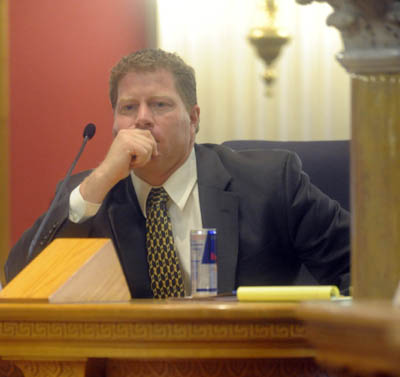Civil unions supporters hope New York, Census data prove to be a double dose of political steroids in GOP talks

Editor’s note: Nearly a dozen interviews were conducted to complete this story. Some sources asked not to be named because of the sensitivity of the issue or they were not at liberty to discuss the matter. Both the governor’s office and House Republican leadership declined to comment.
Armed with new Census data showing a boom in same-sex couples and a political victory in New York, supporters of the Colorado Civil Union Act will meet with state House Republican leaders in the coming weeks to discuss the re-introduction of the bill in 2012.

The aim is to convince Speaker of the House Frank McNulty and Majority Leader Amy Stephens to follow New York Republicans and allow a vote of the full House.
House Republicans at a March 31 Judiciary Committee hearing killed the Colorado Civil Union Act, sponsored by gay Denver Democrats Sen. Pat Steadman and Rep. Mark Ferrandino, on a party-line vote. It had previously passed the Senate with bipartisan support.
Steadman and Ferrandino have promised to reintroduce the bill each year until it is passed.
History appeared likely to repeat itself in 2012: Republicans figuring the political calculus are stuck at an impasse. The House GOP members are caught between their mainstream supporters who are more likely to forgive them for not voting for the civil union bill and their conservative base that will most likely support a primary challenger if they do.
Members of the state House serve two-year terms. All are up for re-election in 2012.
However, proponents believe the argument to pass the bill received a double dose of political steroids after New York Republicans cleared a bill establishing same-sex marriage there and Census data showed the number of same-sex couples in Colorado grew by more than 60 percent since 2000.
But Republicans are still skeptical of how much support the historically Democratic gay and lesbian community will provide them during an election year if they “stick their necks out” and clear the Colorado Civil Union Act.
New York GOP break tradition
New York being the first state to extending marriage rights to same-sex couples, by the will of Republican lawmakers, has changed the debate nationwide and in states where previous attempts have failed – including Colorado.
Republicans – for or against relationship recognition – can no longer skirt the issue.
“For the first time in any state, a marriage bill was passed in a Republican-led legislative chamber. The New York state Senate demonstrated that equality is a nonpartisan issue,” said Brad Clark, executive director of One Colorado, a statewide LGBT advocacy group. “And with similar bipartisan support for civil unions in Colorado, I look forward to the day very soon that gay and lesbian couples in this state can have the critical legal protections they need to take care of and be responsible for their families.”
The composition of New York’s legislature is nearly identical to Colorado’s. In both states one chamber is controlled by Democrats, and another Republicans by one seat.
“Hopefully, this vote will give Republican House leadership more courage to make it happen here,” Ferrandino said.
A number of factors will determine what happens in Colorado.
First, Republicans will still control the House in 2012. Ferrandino said McNulty could change the makeup of the Judiciary Committee that killed the bill last year or assign the bill to a more favorable committee.
But – most importantly – Ferrandino argued, House leadership needs to elevate the pressure it put on its members to block the bill from reaching the House floor.
“(McNulty and House Majority Leader Amy Stephens) made sure it never came to the floor,” he said.
This is in contrast to New York, where Senate leadership opposed the bill, but nevertheless allowed its entire body to vote after weeks of intense negotiations and reassurance from the Democratic governor and high profile GOP donors said they’d support re-election campaigns for those who’s vote resulted in the loss of conservative dollars, The New York Times reported.
“New York should be an example of what to do,” Ferrandino said.
But don’t expect Gov. John Hickenlooper to do any heavy lifting. The first-term governor – widely regarded as an LGBT advocate – was practically invisible on the issue until the day of the House committee hearing when his chief-of-staff a letter to supporters rallying on the west steps of the Capitol.
What the public didn’t see was Hickenlooper working the phones urging the Judiciary committee members and leadership to pass the bill to the full House, Clark said.
Census adds teeth to 2011 argument
One of the pillars of One Colorado’s argument to pass the Colorado Civil Union Act in 2011 was the number of same-sex couples living in the Centennial State.
According to data from the American Community Survey released in a Williams Institute Report during the civil union debate here, there were an estimated 12,558 same-sex couples in Colorado. That same study estimated about 3,500 of those couples would apply for civil unions. However, Republicans didn’t put much stock in that report, sources told Out Front Colorado.
Now, with a fixed number backed by the Census – 16,114 couples, 3,690 with children – the number of couples likely to apply for civil unions is sure to increase, and the case for civil unions redoubled.
“This data is critical,” Clark said. “It shows our community lives throughout the entire state.”
Well, almost the entire state.
Gay and lesbian couples live in every Colorado county except two – Jackson and San Juan – according to the Census.
Jackson County runs along the northern boarder of the state and is just east of Larimer. To the west is Routt.
San Juan County lies in the southwest corner of the state. It is just north of La Plata and south of Ourary. Other counties surrounding San Juan include Dolores, San Miguel and Hinsdale.
On average, gay and lesbian couples account for about 0.8 percent of all families. However, 1 percent of couples in Denver, Gilpin, Lincoln, Mineral, Ourary and Saguache counties are gay or lesbian.
Counties with the most gay and lesbian couples in descending order are: Denver (4,052), Arapahoe (1,669), Jefferson (1,629), El Paso (1,550) and Adams (1,260).
While most same-sex couples live along the front rage, statistically, the ratio to heterosexual married couples is spread evenly across the state with high and low proportions in all geographical areas.
Three of the counties with the highest percentage of same-sex couples are in the southwest, two in metro-Denver and one on the Eastern Plains.
“These numbers re-enforce what we found through our research,” Clark said. “Equality is not isolated to just two parts of the state. Gay and lesbian Coloradans are facing issues of inequality in rural towns and urban centers.”
Across the state, 26 percent of lesbian couples are raising children compared to 18 percent of gay men.
Clark said the Census data reaffirms the fact One Colorado attempted to make during the 2011 General Assembly: every lawmaker represents gay and lesbian couples.
“This data continues the story that gays and lesbian couples are denied the critical legal protections they deserve,” Clark said. “We know there are no legislators that are isolated from constituents that need these protections.”
Six state House Republicans voted against the Colorado Civil Union Act when it appeared March 31 before their Judiciary Committee, effectively killing it.
Those six representatives – Brian DelGroso, B.J. Nikkel, Bob Gardner, Mark Barker, Mark Waller and Jerry Sonnenberg – denied approximately 3,068 families they collectively represent.
Clark said his organization is working to connect same-sex couples from every district with their lawmaker.
“These gay and lesbian families have the same hopes and dreams as any other family,” Clark said. “These numbers, they should reaffirm that.”
Chicken or the egg
Colorado politics was forever changed in 2004 when Tim Gill, a gay philanthropist, teamed with now-U.S. Rep. Jared Polis, a gay Democrat from Boulder, billionaire Pat Stryker and multimillionaire Rutt Bridges to support progressive, pro-equality candidates for the Colorado General Assembly.
In a matter of four years Colorado went from being a solid red state to blue, through and through.
Republicans are rightfully terrified of losing their one-seat majority in the House where the total seats won were taken by just a few hundred votes each, including a seat belonging to one of the Republicans who killed the civil union bill, Colorado Spring’s Mark Barker.
But before House Republicans can get to the 2012 general election, they may have to clear primary challengers that are more conservative and more anti-gay.
New York Republicans were matched with donors to supplement their financial losses if their vote for same-sex marriage proves toxic, which is still yet to be determined. But, those interviewed by Out Front Colorado suggest a similar situation is not likely here.
However, another insider familiar with One Colorado and Gill’s other operation, Gill Action, pointed to reports of the millionaire donating to the national Log Cabin Republican organization and working with Republican strategists to seal the deal in New York.
“We would love nothing more than to have this bill pass in 2012 with bi-partisan support,” the individual said.
Adding that One Colorado, which received seed money from Gill, has sworn its support to pro-equality legislators regardless of party affiliation. “They would love to be there for them.”
One Colorado does have an opportunity to play a role in elections with its political action committee. Under Colorado law, One Colorado PAC can raise an unlimited amount of money in $525 increments from donors. They can then release those funds in $400 donations to candidates it endorses for the state legislature.
In 2010, One Colorado PAC donated $3,000 to candidates – all Democrats. The PAC endorsed twoRepublicans, speaker pro-tem Kevin Priola and Rep. Larry Liston.
Moreover, One Colorado’s spokeswoman Jessica Cook Woodrum pointed out, the PAC mobilized volunteers to knock on hundreds of doors and make thousands of phone calls for those candidates they endorsed. And its volunteer base has only grown.
However, documents reviewed by Out Front Colorado shows the PAC hasn’t raised a dollar since the 2010 election.
“Our plans have not been made yet,” Cook Woodrum said when asked if One Colorado would be involved in potential Republican primaries. “We’re focused on appealing to the heartstrings of lawmakers in the next session.”
But she reiterated One Colorado would support any candidate who supported civil unions and hopes the House Republican leadership doesn’t make its decision based on $400 campaign pledges.
“I have to hope the Republican legislators are (voting for civil unions) because it’s the right thing to do and are overwhelmed by contacts from their constituency that supports this,” she said.
Cook Woodrum said a space needs to be created to allow House lawmakers to vote on this issue.
The question remains, will the gay and lesbian community provide shelter?
“Our challenge with any Republican legislator is to show them they have to have the courage not to pander to the smallest part of their base,” she said. “Republicans need to think about how they can work with and be supported by an organization that made 20,000 contacts during the last session. I have to hope that will help them have the courage they need.”
What's Your Reaction?
Out Front contributor Nic Garcia is a lifelong journalist and works for Colorado education policy news organization EdNewsColorado. He was an Out Front managing editor, associate publisher and executive editor from 2011 to 2013.










